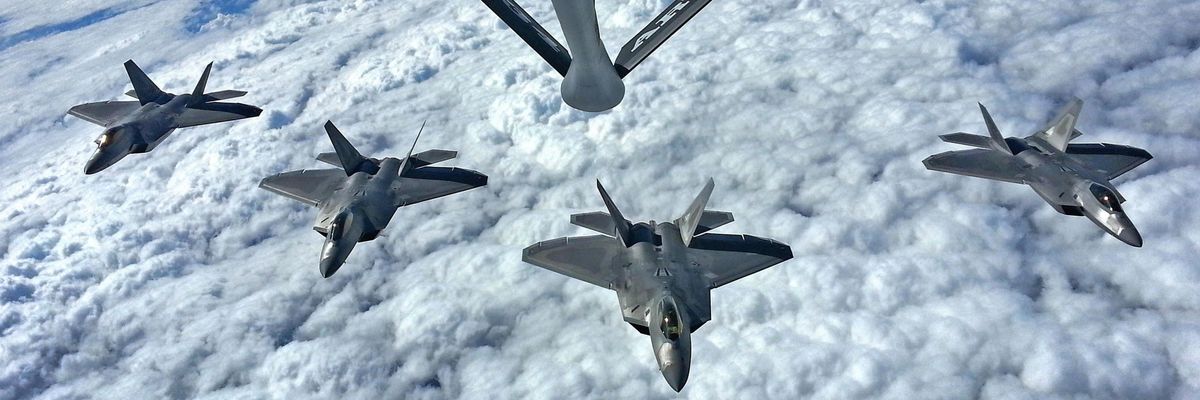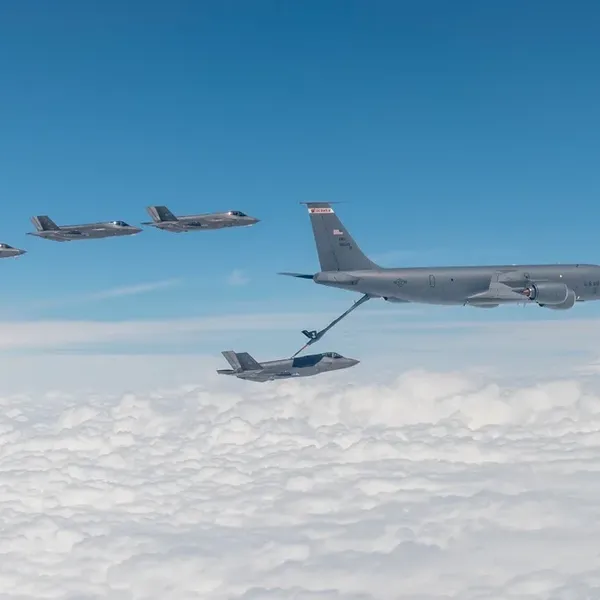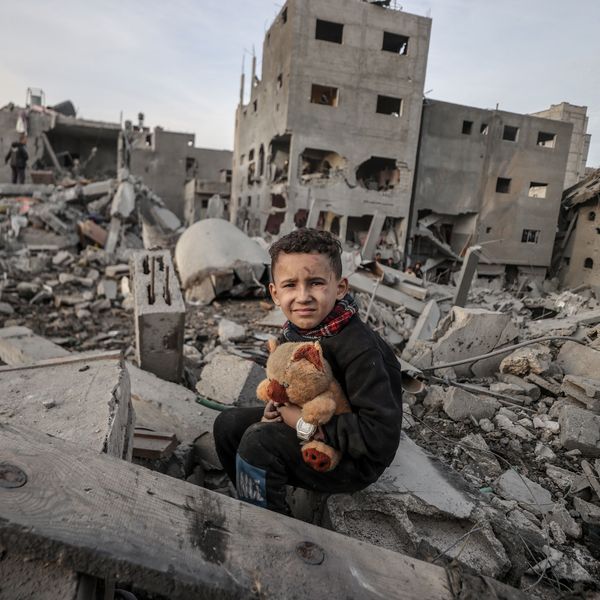
More than $1.2 billion worth of Lockheed Martin F-22 Raptor fighter jets fly in formation above Indiana. (Photo: Col. Hiram Gates/USAF)
Demanding 'Global Peace Dividend,' Nobel Laureates Call for 2% Cut in World's Military Spending
"We propose that half of the resources freed up by this agreement are allocated to a global fund, under U.N. supervision, to address humanity’s grave common problems: pandemics, climate change, and extreme poverty."
In a move they say will save $1 trillion over five years "to fight planetary emergencies" like "pandemics, climate change, and extreme poverty," a group of over 50 Nobel laureates this week published an open letter calling on countries to generate a "global peace dividend" by reducing their military spending by 2%.
"Humankind faces risks that can only be averted through cooperation. Let us cooperate, instead of fighting among ourselves."
"World military spending has doubled since 2000. It is approaching $2 trillion U.S. dollars per year, and is increasing in all regions of the world," the letter--which is being coordinated by physicists Carlo Rovelli and Matteo Smerlak--states.
"Individual governments are under pressure to increase military spending because others do so," the signers continue. "The feedback mechanism sustains a spiraling arms race--a colossal waste of resources that could be used far more wisely."
The letter's signatories include mostly Nobel science and medicine laureates, as well as a handful of winners in the peace, economics, and literature categories. The heads of several national academies also signed, and Tibetan spiritual leader and Nobel Peace Prize winner the Dalai Lama expressed his "appreciation and support" for the initiative.
\u201chttps://t.co/mqiV2q7W4h It is out!! 50 Nobels, including the Dalai Lama, support the "Simple Proposal to humankind": resources to address the planetary urgencies by a negotiated global decrease of military spending. Please sign in support!! #GlobalPeaceDividend @GlobalPeaceDivd\u201d— carlo rovelli (@carlo rovelli) 1639437309
"Past arms races have often had the same outcome: deadly and destructive conflicts," the signers note. "We have a simple proposal for humankind: The governments of all U.N. member-states should negotiate a joint reduction of their military expenditure by 2% every year for five years."
"We propose that half of the resources freed up by this agreement are allocated to a global fund, under U.N. supervision, to address humanity's grave common problems: pandemics, climate change, and extreme poverty."
"The other half remains at the disposal of individual governments," the signers explain. "All countries will therefore have significant new resources. Some of these can be used to redirect the strong research capacities of military industries towards urgently needed peaceful applications."
\u201cMore than 50 Nobel laureates have signed an appeal for a "Global Peace Dividend", proposing that states decide a 2% reduction of their military spending and to use these funds to fight against climate change, pandemics, and extreme poverty. Read, co-sign:\nhttps://t.co/xjYjCEVOyN\u201d— Wolfgang Lucht (@Wolfgang Lucht) 1639517135
"History shows that agreements to limit the proliferation of weapons are achievable: thanks to the SALT and START [Strategic Arms Limitation Talks and Strategic Arms Reduction] treaties, the United States and the Soviet Union have reduced their nuclear arsenals by 90% since the 1980s," the letter states--its only reference to specific countries.
With a military budget of $778 billion, the United States spends more annually on its armed forces than the next 11 nations combined, according to the Stockholm International Peace Research Institute. The U.S. is followed by China ($252 billion), India ($72.9 billion), Russia ($61.7 billion), and the United Kingdom ($59.2 billion)--all of which increased their military spending in 2020.
\u201cU.S. military: "Disposing toxic chemicals is too expensive, so we have to release it into Okinawa's water."\n\nU.S. military budget: $778 billion\u201d— Rob Kajiwara \uff5c\u6bd4\u5609\u5b5d\u660c\uff5c \u9b4f\u5b5d\u660c \ud83c\udf42 (@Rob Kajiwara \uff5c\u6bd4\u5609\u5b5d\u660c\uff5c \u9b4f\u5b5d\u660c \ud83c\udf42) 1631068114
"Such negotiations can succeed because they are rational: each actor benefits from its adversaries' armaments reduction, and so does humanity as a whole," the letter's signatories assert. "Humankind faces risks that can only be averted through cooperation. Let us cooperate, instead of fighting among ourselves."
An Urgent Message From Our Co-Founder
Dear Common Dreams reader, The U.S. is on a fast track to authoritarianism like nothing I've ever seen. Meanwhile, corporate news outlets are utterly capitulating to Trump, twisting their coverage to avoid drawing his ire while lining up to stuff cash in his pockets. That's why I believe that Common Dreams is doing the best and most consequential reporting that we've ever done. Our small but mighty team is a progressive reporting powerhouse, covering the news every day that the corporate media never will. Our mission has always been simple: To inform. To inspire. And to ignite change for the common good. Now here's the key piece that I want all our readers to understand: None of this would be possible without your financial support. That's not just some fundraising cliche. It's the absolute and literal truth. We don't accept corporate advertising and never will. We don't have a paywall because we don't think people should be blocked from critical news based on their ability to pay. Everything we do is funded by the donations of readers like you. Will you donate now to help power the nonprofit, independent reporting of Common Dreams? Thank you for being a vital member of our community. Together, we can keep independent journalism alive when it’s needed most. - Craig Brown, Co-founder |
In a move they say will save $1 trillion over five years "to fight planetary emergencies" like "pandemics, climate change, and extreme poverty," a group of over 50 Nobel laureates this week published an open letter calling on countries to generate a "global peace dividend" by reducing their military spending by 2%.
"Humankind faces risks that can only be averted through cooperation. Let us cooperate, instead of fighting among ourselves."
"World military spending has doubled since 2000. It is approaching $2 trillion U.S. dollars per year, and is increasing in all regions of the world," the letter--which is being coordinated by physicists Carlo Rovelli and Matteo Smerlak--states.
"Individual governments are under pressure to increase military spending because others do so," the signers continue. "The feedback mechanism sustains a spiraling arms race--a colossal waste of resources that could be used far more wisely."
The letter's signatories include mostly Nobel science and medicine laureates, as well as a handful of winners in the peace, economics, and literature categories. The heads of several national academies also signed, and Tibetan spiritual leader and Nobel Peace Prize winner the Dalai Lama expressed his "appreciation and support" for the initiative.
\u201chttps://t.co/mqiV2q7W4h It is out!! 50 Nobels, including the Dalai Lama, support the "Simple Proposal to humankind": resources to address the planetary urgencies by a negotiated global decrease of military spending. Please sign in support!! #GlobalPeaceDividend @GlobalPeaceDivd\u201d— carlo rovelli (@carlo rovelli) 1639437309
"Past arms races have often had the same outcome: deadly and destructive conflicts," the signers note. "We have a simple proposal for humankind: The governments of all U.N. member-states should negotiate a joint reduction of their military expenditure by 2% every year for five years."
"We propose that half of the resources freed up by this agreement are allocated to a global fund, under U.N. supervision, to address humanity's grave common problems: pandemics, climate change, and extreme poverty."
"The other half remains at the disposal of individual governments," the signers explain. "All countries will therefore have significant new resources. Some of these can be used to redirect the strong research capacities of military industries towards urgently needed peaceful applications."
\u201cMore than 50 Nobel laureates have signed an appeal for a "Global Peace Dividend", proposing that states decide a 2% reduction of their military spending and to use these funds to fight against climate change, pandemics, and extreme poverty. Read, co-sign:\nhttps://t.co/xjYjCEVOyN\u201d— Wolfgang Lucht (@Wolfgang Lucht) 1639517135
"History shows that agreements to limit the proliferation of weapons are achievable: thanks to the SALT and START [Strategic Arms Limitation Talks and Strategic Arms Reduction] treaties, the United States and the Soviet Union have reduced their nuclear arsenals by 90% since the 1980s," the letter states--its only reference to specific countries.
With a military budget of $778 billion, the United States spends more annually on its armed forces than the next 11 nations combined, according to the Stockholm International Peace Research Institute. The U.S. is followed by China ($252 billion), India ($72.9 billion), Russia ($61.7 billion), and the United Kingdom ($59.2 billion)--all of which increased their military spending in 2020.
\u201cU.S. military: "Disposing toxic chemicals is too expensive, so we have to release it into Okinawa's water."\n\nU.S. military budget: $778 billion\u201d— Rob Kajiwara \uff5c\u6bd4\u5609\u5b5d\u660c\uff5c \u9b4f\u5b5d\u660c \ud83c\udf42 (@Rob Kajiwara \uff5c\u6bd4\u5609\u5b5d\u660c\uff5c \u9b4f\u5b5d\u660c \ud83c\udf42) 1631068114
"Such negotiations can succeed because they are rational: each actor benefits from its adversaries' armaments reduction, and so does humanity as a whole," the letter's signatories assert. "Humankind faces risks that can only be averted through cooperation. Let us cooperate, instead of fighting among ourselves."
In a move they say will save $1 trillion over five years "to fight planetary emergencies" like "pandemics, climate change, and extreme poverty," a group of over 50 Nobel laureates this week published an open letter calling on countries to generate a "global peace dividend" by reducing their military spending by 2%.
"Humankind faces risks that can only be averted through cooperation. Let us cooperate, instead of fighting among ourselves."
"World military spending has doubled since 2000. It is approaching $2 trillion U.S. dollars per year, and is increasing in all regions of the world," the letter--which is being coordinated by physicists Carlo Rovelli and Matteo Smerlak--states.
"Individual governments are under pressure to increase military spending because others do so," the signers continue. "The feedback mechanism sustains a spiraling arms race--a colossal waste of resources that could be used far more wisely."
The letter's signatories include mostly Nobel science and medicine laureates, as well as a handful of winners in the peace, economics, and literature categories. The heads of several national academies also signed, and Tibetan spiritual leader and Nobel Peace Prize winner the Dalai Lama expressed his "appreciation and support" for the initiative.
\u201chttps://t.co/mqiV2q7W4h It is out!! 50 Nobels, including the Dalai Lama, support the "Simple Proposal to humankind": resources to address the planetary urgencies by a negotiated global decrease of military spending. Please sign in support!! #GlobalPeaceDividend @GlobalPeaceDivd\u201d— carlo rovelli (@carlo rovelli) 1639437309
"Past arms races have often had the same outcome: deadly and destructive conflicts," the signers note. "We have a simple proposal for humankind: The governments of all U.N. member-states should negotiate a joint reduction of their military expenditure by 2% every year for five years."
"We propose that half of the resources freed up by this agreement are allocated to a global fund, under U.N. supervision, to address humanity's grave common problems: pandemics, climate change, and extreme poverty."
"The other half remains at the disposal of individual governments," the signers explain. "All countries will therefore have significant new resources. Some of these can be used to redirect the strong research capacities of military industries towards urgently needed peaceful applications."
\u201cMore than 50 Nobel laureates have signed an appeal for a "Global Peace Dividend", proposing that states decide a 2% reduction of their military spending and to use these funds to fight against climate change, pandemics, and extreme poverty. Read, co-sign:\nhttps://t.co/xjYjCEVOyN\u201d— Wolfgang Lucht (@Wolfgang Lucht) 1639517135
"History shows that agreements to limit the proliferation of weapons are achievable: thanks to the SALT and START [Strategic Arms Limitation Talks and Strategic Arms Reduction] treaties, the United States and the Soviet Union have reduced their nuclear arsenals by 90% since the 1980s," the letter states--its only reference to specific countries.
With a military budget of $778 billion, the United States spends more annually on its armed forces than the next 11 nations combined, according to the Stockholm International Peace Research Institute. The U.S. is followed by China ($252 billion), India ($72.9 billion), Russia ($61.7 billion), and the United Kingdom ($59.2 billion)--all of which increased their military spending in 2020.
\u201cU.S. military: "Disposing toxic chemicals is too expensive, so we have to release it into Okinawa's water."\n\nU.S. military budget: $778 billion\u201d— Rob Kajiwara \uff5c\u6bd4\u5609\u5b5d\u660c\uff5c \u9b4f\u5b5d\u660c \ud83c\udf42 (@Rob Kajiwara \uff5c\u6bd4\u5609\u5b5d\u660c\uff5c \u9b4f\u5b5d\u660c \ud83c\udf42) 1631068114
"Such negotiations can succeed because they are rational: each actor benefits from its adversaries' armaments reduction, and so does humanity as a whole," the letter's signatories assert. "Humankind faces risks that can only be averted through cooperation. Let us cooperate, instead of fighting among ourselves."

